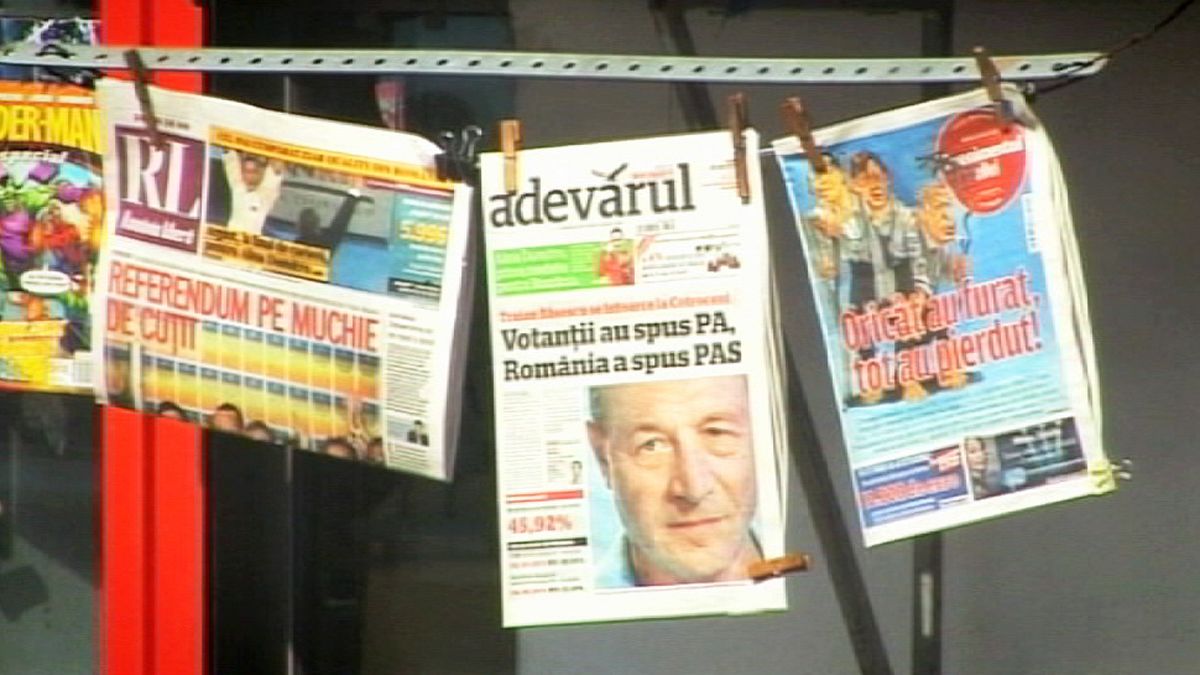Romania’s Prime Minister Victor Ponta has pledged not to continue his efforts to oust president Traian Basescu, after he survived an impeachment referendum.
On Sunday, Ponta had called for Basescu’s resignation.
However, his attempt to remove the president has drawn anger from the EU, and the required 50 percent turnout for the ballot did not materialise.
Of the 46 percent of people who did vote on Sunday, more than 87 percent wanted Basescu out.
Both the president and the opposition Democratic Liberal Party had urged people to boycott the ballot.
Despite lack of support shown by the voting figures and Basescu’s falling popularity, some are glad he is still the president.
Many speculate the rivalry between the
prime minister and Basescu will continue.
However, Ponta will have to tread carefully after receiving a dressing down earlier this month from European Commission President Manuel Barroso.
There is concern from the EU over what is seen as Ponta’s disregard for the Romanian constitution.
In addition, Ponta ignored a ruling by the country’s high court and travelled to an EU summit in Brussels after a ruling that president Basescu is Romania’s only authorised representative for summits in Brussels.
euronews spoke to President and co-founder of the Romanian Academic Society (SAR).
euronews: “President Traian Basescu stays in power but opinion polls show Romanians do not want him to. How do we explain this contradictory referendum result?”
Pippidi:
“Well, I would say that the major fact that determined the outcome of the referendum in Romania is basically the European Union’s decision to hold the Romanian government to following the old rule [stating] that the referendum is validated with total turnout by the former census results.
“Romania’s administrative capacity is so low that two years after the last census, the voting lists still don’t match the results of the census.
“The total population of Romania is more than 19 million, nevertheless the voting lists show 18 million voters, so 18 million adults. In other words, there are about 2 millions ghost Romanians who could not vote in this referendum.
“So it (50 percent) was a very high turnout condition which explains (that) whilst it was a high turnout, nevertheless the participation condition was not met.
“In other words there were not 51 percent of total people included in these old voting lists and this was a condition that European Union asked for. Changing this on the eve of the vote would indeed have been problematic, but the EU did not realize that this condition was introduced just a year ago by President Basescu, because we have continuous manipulation of voting lists and rules referring to the vote here.
“So in the end people simply turned out and simply voted for nothing.”
euronews: “The European Commission practically helped in biasing the results of this referendum? Do I understand correctly?”
Pippidi: “Yes, I would say that in an unprecedented way, the EU really contributed to this result, which indeed is quite a source of frustration in Romania presently.
“The fact that we have over eight million people who showed up and who voted quite clearly against Mr Basescu, but the vote will not be validated, basically due to a technicality.”
euronews: “Could you please explain to us the connection between Europe’s stance on this referendum and the economic trend.”
Pippidi: “I think the European Union, on this referendum, sided with President Basescu because they had no other guarantee that the independence of the judiciary will not be infringed upon. At the same time, perhaps they did not realise (what) this means; to what extent this actually means continuous instability for Romania.
“Basescu now has 80 percent of the vote against him and he still has nearly two years of mandate to go on. Romania has legislative elections in the fall (autumn) which, for certain, will return a majority against him.
“That means that two years from now, Romanians are going to be in a continuous electoral campaign, in a continuous political crisis and instability which of course will affect very seriously the currency and the economy.
euronews: “President Basescu wants to be seen as the “torch bearer” of the “flame of democracy.” Is he the champion of democracy?”
Pippidi: “I would say President Basescu has the historical merit of allowing for the first time the two general prosecutors of Romania to be selected by free competition and not to be pushed forward by various vested interests, as was the tradition in the past.
“The problem is that the mandates of those two general prosecutors expire in August, hence this very strong political fight to control who is going to be appointed next.
“As to his performance in other areas of democracy, besides anti-corruption prosecution, I would say that this is far more doubtful.”
euronews: “Is President Traian Basescu the only Romanian politician granting judiciary independence?”
Pippidi: “The best defender of the independence of the judiciary is the judiciary itself and the Romanian civil society which protects it.
“Now this being said, I think that Europe has the right and it should in fact ask for very strong guarantees from the new government of Romania that a clear and transparent process will exist for the appointment of these two general prosecutors.
Because there is evidence that vested interests, people who indeed are charged with corruption, and some of them even sentenced in courts, work a lot to influence the new government and control this kind of appointment.”
